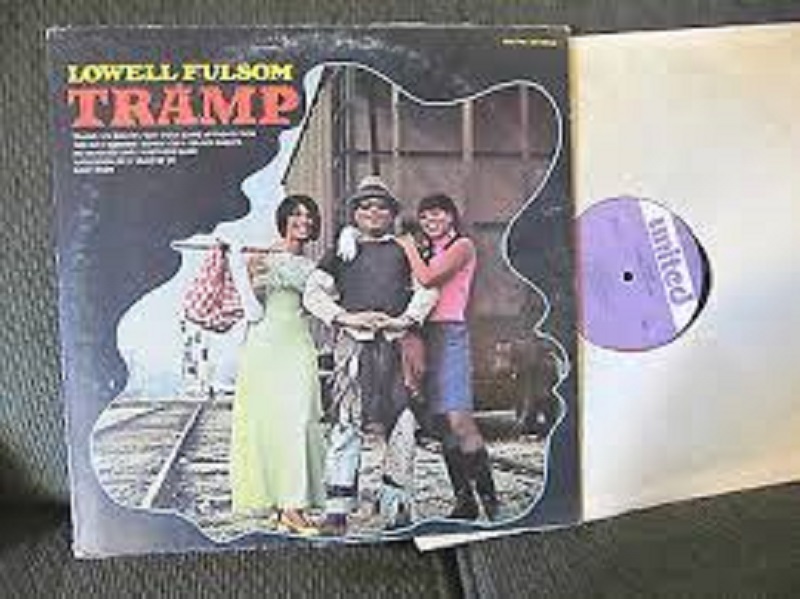Lowell Fulson Vinyl Records Lps For Sale
Lowell Fulson was an American Blues guitarist, singer and songwriter. He was born in 1921 in Atoka, Oklahoma. He was the son of Mamie and Martin Fulson. At an early age, he moved to Clarita with his mother and brothers after his father got killed. In 1943, he was drafted and served the U.S. Navy until 1945. Moreover, He joined Alger “Texas” Alexander (an American blues singer) for some time when he was eighteen. Alger “Texas” Alexander had a great influence on him that motivated him to form his own band when he moved to California. His band included Stanley Turrentine (a saxophone player) and Ray Charles (an American musician). Jackie Brenston was also a part of Fulson’s band from 1952 to 1954. Lowell Fulson worked under many labels including Swing Time (in the 1940s), Chess Records (in the 1950s), Keny Records (in the 1960s), Rounder Records (in the 1970s), etc. His song genres mainly included jump blues and west-coast blues. Fulson inked a longterm contract with Chess in 1954 after a one-off session in New Orleans in 1953 for Aladdin. In 1965 he recorded the song Black Nights which was his first hit in the whole decade. Later in the same year, his recording Tramp did even better which helped him to restore his R&B stardom. The duet of Every Day I Have the Blues with Jimmy Rogers was the last recording of Fulson. He remained active from the 1940s to 1999 as he died in 1999 (a few weeks before his 78th birthday). According to his partner, Tina Mayfield, the causes of Fulson’s death were diabetes, heart failure and complications due to kidney disease. His most influential and memorable recordings include 3 O’Clock Blues, Every Day I Have the Blues, Reconsider Baby and Tramp. We recommend starting your Lowell Fulson vinyl collection with albums like The Blues Got Me Down and I Don’t Know My Mind. Check out more vinyl records for sale from blues musicians.
Lowell Fulson
$19.95 (as of July 4, 2025 03:48 GMT +00:00 - More infoProduct prices and availability are accurate as of the date/time indicated and are subject to change. Any price and availability information displayed on [relevant Amazon Site(s), as applicable] at the time of purchase will apply to the purchase of this product.)Tramp
Lowell Fulson - Lonesome Christmas - 7 Inch 45 RPM vinyl record - Black labels - THIS IS RECORDED MUSIC.
$5.95 (as of July 4, 2025 03:52 GMT +00:00 - More infoProduct prices and availability are accurate as of the date/time indicated and are subject to change. Any price and availability information displayed on [relevant Amazon Site(s), as applicable] at the time of purchase will apply to the purchase of this product.)Lowell Fulson: Lonesome Christmas (Part 1) b/w Lonesome Christmas (Part 2)
$14.00 (as of July 4, 2025 03:48 GMT +00:00 - More infoProduct prices and availability are accurate as of the date/time indicated and are subject to change. Any price and availability information displayed on [relevant Amazon Site(s), as applicable] at the time of purchase will apply to the purchase of this product.)Lowell Fulson - The Original Lonesome Christmas Part 1 bw Part 2-7 inch Vinyl Single Record - Red Labels 1955
$5.95 (as of July 4, 2025 03:47 GMT +00:00 - More infoProduct prices and availability are accurate as of the date/time indicated and are subject to change. Any price and availability information displayed on [relevant Amazon Site(s), as applicable] at the time of purchase will apply to the purchase of this product.)LOVEMAKER LP (VINYL ALBUM) US BIG TOWN 1978
Lowell Fulson The Original Lonesome Christmas Part One & Two 45 rpm single
$7.00 (as of July 4, 2025 03:54 GMT +00:00 - More infoProduct prices and availability are accurate as of the date/time indicated and are subject to change. Any price and availability information displayed on [relevant Amazon Site(s), as applicable] at the time of purchase will apply to the purchase of this product.)Lowell Fulson - The Original Lonesome Christmas - 7" Vinyl 45 Record
$5.49 (as of July 4, 2025 03:54 GMT +00:00 - More infoProduct prices and availability are accurate as of the date/time indicated and are subject to change. Any price and availability information displayed on [relevant Amazon Site(s), as applicable] at the time of purchase will apply to the purchase of this product.)Texas Blues: Anthology of The Blues
$29.99 (as of July 4, 2025 03:47 GMT +00:00 - More infoProduct prices and availability are accurate as of the date/time indicated and are subject to change. Any price and availability information displayed on [relevant Amazon Site(s), as applicable] at the time of purchase will apply to the purchase of this product.)Merry Christmas Baby - LP Vinyl Record
$24.99 (as of July 4, 2025 03:48 GMT +00:00 - More infoProduct prices and availability are accurate as of the date/time indicated and are subject to change. Any price and availability information displayed on [relevant Amazon Site(s), as applicable] at the time of purchase will apply to the purchase of this product.)
Lowell Fulson, a name synonymous with the soulful strains of blues, emerged as a pivotal figure in the mid-20th century music scene. Born on March 31, 1921, in Tulsa, Oklahoma, Fulson’s impact on the blues genre and his unique musical journey continue to influence musicians across generations. This article delves into the life and career of Lowell Fulson, exploring the man behind the music and the evolution of his distinctive style.
Early Years and Musical Roots
Lowell Fulson’s musical journey began in the fertile soil of the Deep South, where the blues were deeply rooted in the African American experience. Raised in a family that appreciated music, Fulson absorbed the rich sounds of the region, drawing inspiration from gospel, traditional folk, and early blues. His early exposure to the guitar, alongside his natural talent, laid the foundation for a career that would leave an indelible mark on the blues landscape.
Migration to California and Rise to Prominence
In the midst of the Great Depression and the Dust Bowl, Fulson’s family, like many others, migrated to California in search of a better life. Settling in the vibrant musical landscape of Oakland, a young Fulson found himself amidst a burgeoning blues scene that would shape his artistic vision. It was during this time that he began making a name for himself as a skilled guitarist and expressive vocalist.
Fulson’s breakthrough came with the release of his 1948 single “Three O’Clock Blues,” a collaboration with pianist Lloyd Glenn. The song catapulted him into the limelight, showcasing his emotive vocal delivery and masterful guitar work. The success of “Three O’Clock Blues” marked the beginning of a remarkable career that would see Fulson become a leading figure in the West Coast blues scene.
The West Coast Blues Sound
Lowell Fulson’s contribution to the blues extends beyond his individual success – he played a pivotal role in shaping the West Coast blues sound. The West Coast blues differed from its Delta and Chicago counterparts, featuring a smoother, jazz-influenced style that resonated with a broader audience. Fulson’s soulful voice and sophisticated guitar playing became emblematic of this evolving musical landscape.
Fulson’s collaborations with other notable musicians, including Ray Charles and Billy Vera, further solidified his status as a key player in the West Coast blues movement. His ability to seamlessly blend elements of jazz, rhythm and blues, and traditional blues set him apart as an innovator, expanding the genre’s boundaries.
Signature Style and Influences
At the core of Lowell Fulson’s enduring legacy lies his signature style, a unique blend of deep blues roots and contemporary influences. His guitar playing, characterized by expressive bends and articulate phrasing, showcased a deep understanding of the emotional nuances within the blues. Fulson’s vocal delivery, gritty and soulful, conveyed a raw authenticity that resonated with listeners.
Fulson’s influences were diverse, ranging from the Delta blues of Robert Johnson to the jazz stylings of Nat King Cole. This amalgamation of musical inspirations contributed to the richness of his sound, making him a dynamic force within the blues genre. His ability to evolve with the changing musical landscape allowed Fulson to maintain relevance and captivate audiences across different eras.
Hits and Notable Albums
Throughout his career, Lowell Fulson produced an array of hits and released albums that showcased the depth and versatility of his musical talent. Some of his notable songs include “Reconsider Baby,” “Everyday I Have the Blues,” and “Tramp.” These tracks not only topped the charts but also solidified Fulson’s reputation as a master storyteller through his music.
His albums, such as “Hung Down Head” (1963) and “Soul” (1966), demonstrated his ability to adapt to evolving musical trends while staying true to his blues roots. Fulson’s prolific output showcased his enduring creativity and cemented his status as a respected figure within the blues community.
Influence on Future Generations
Lowell Fulson’s impact on the blues extends far beyond his own era, influencing a multitude of musicians across genres. His distinctive guitar style and emotive vocals have left an indelible mark on artists ranging from B.B. King and Eric Clapton to contemporary blues musicians like Joe Bonamassa. Fulson’s ability to bridge the gap between traditional blues and modern musical elements has made his work timeless, ensuring its continued relevance in the ever-evolving landscape of popular music.
Lowell Fulson’s journey through the blues reflects not only the evolution of a genre but also the resilience of an artist dedicated to expressing the depth of the human experience through music. From his early days in Oklahoma to the vibrant blues scene of California, Fulson’s career is a testament to the enduring power of the blues and its ability to transcend time and cultural boundaries. As we continue to appreciate the legacy of Lowell Fulson, we are reminded of the profound impact that one artist can have on the trajectory of a musical genre.
Lowell Fulson - S/T US 1976 1st Chess 2-ACMB-205 R&B Country Blues EX 2xLP 1976
 | $29.95 Buy It on eBay for only: $29.95 Buy It Now on eBay |
LOWELL FULSON The Ol' Blues Singer GRANITE LP NM SHRINK c
 | $8.00 End Date: Monday Jul-07-2025 17:00:07 EDT Buy It on eBay for only: $8.00 Buy It Now on eBay |
Blues 45 - Lowell Fulson - Every Day I Have The Blues/Guitar Shuffle - Hollywood
 | $8.00 (1 bid) End Date: Sunday Jul-06-2025 12:22:00 EDT Bid |
LOWELL FULSON~CHECK YOURSELF/LOVING YOU (1955) RARE BLUES 45 PROMO CHECKER 812
 | $20.00 Buy It on eBay for only: $20.00 Buy It Now on eBay |
Checker 78 RPM Lowell Fulson - Reconsider Baby 804 V- R&B Blues
 | $4.99 Buy It on eBay for only: $4.99 Buy It Now on eBay |
LOWELL FULSON The Ol' Blues Singer GRANITE GS-1006 LP SEALED
 | $34.95 Buy It on eBay for only: $34.95 Buy It Now on eBay |
Lowell Fulson - I've Got The Blues - CD - NEW - SEALED
 | $14.95 Buy It on eBay for only: $14.95 Buy It Now on eBay |
LOWELL FULSON EVERYDAY I HAVE THE BLUES TRIO PA3121 Japan VINYL LP
 | $3.99 End Date: Wednesday Jul-09-2025 21:00:20 EDT Buy It on eBay for only: $3.99 Buy It Now on eBay |
LOWELL FULSON - 78rpm R&B - SWING TIME #272 - BLUES WITH A FEELIN /CAN'T YOU CRY
 | $14.99 End Date: Sunday Jul-06-2025 08:28:24 EDT Buy It on eBay for only: $14.99 Buy It Now on eBay |
Lowell Fulson LP The Ol' Blues Singer 1976 VG+/EX
 | $11.00 Buy It on eBay for only: $11.00 Buy It Now on eBay |
LOWELL FULSON - 1959 ELECTRIC BLUES - EX/NM VINYL & GREAT AUDIO - THAT'S ALRIGHT
 | $14.99 Buy It on eBay for only: $14.99 Buy It Now on eBay |
Lowell Fulson - It's A Good Day (1988 Vinyl Record LP) Rounder Records 2088
 | $9.00 Buy It on eBay for only: $9.00 Buy It Now on eBay |
HEAR Lowell Fulson 45 Don't Drive Me Baby / You're Gonna Miss Me R&B blues
 | $14.99 Buy It on eBay for only: $14.99 Buy It Now on eBay |
Lowell Fulson - Hung Down Head Promo VG/VG+
 | $19.95 Buy It on eBay for only: $19.95 Buy It Now on eBay |
1951 LOWELL FULSON COMBO 78 rpm SWING TIME 196 EVERYDAY I HAVE THE BLUES E
 | $30.00 Buy It on eBay for only: $30.00 Buy It Now on eBay |
LOWELL FULSON 2 LP BLUES MASTERS CHESS 2ACMB-205 STEREO 1976 Blues
 | $40.00 Buy It on eBay for only: $40.00 Buy It Now on eBay |
LOWELL FULSON RECONSIDER BABY ~ I BELIEVE I'LL GIVE IT UP 10" 1954 BLUES VG!
 | $18.99 Buy It on eBay for only: $18.99 Buy It Now on eBay |
78rpm Blues Jazz R&B Lot 16 Records Nolan Strong Lowell Fulson T-Bone Walker
 | $48.00 End Date: Tuesday Jul-08-2025 19:31:56 EDT Buy It on eBay for only: $48.00 Buy It Now on eBay |
Lowell Fulson TROUBLES WITH THE BLUES (BLUES 45) #1046 PLAYS VG++
 | $14.99 Buy It on eBay for only: $14.99 Buy It Now on eBay |
LOWELL FULSON: tollin' bells / it's your fault baby CHECKER 7" Single 45 RPM
 | $15.00 Buy It on eBay for only: $15.00 Buy It Now on eBay |























![Back to Black [Vinyl] #1](https://m.media-amazon.com/images/I/61Db7-hQGKL._SL100_.jpg)

![GNX[LP] #1](https://m.media-amazon.com/images/I/51EXnBFIdPL._SL100_.jpg)

![Legend [Vinyl] #1](https://m.media-amazon.com/images/I/611La+6Hi9L._SL100_.jpg)
![Legend [Vinyl] #2](https://m.media-amazon.com/images/I/31nfAYBov8L._SL100_.jpg)
![Legend [Vinyl] #3](https://m.media-amazon.com/images/I/21h7ykrSuuL._SL100_.jpg)
![Legend [Vinyl] #4](https://m.media-amazon.com/images/I/318kzRTVolL._SL100_.jpg)
![Legend [Vinyl] #5](https://m.media-amazon.com/images/I/31vjgY6+u5L._SL100_.jpg)



![[Exquisite Appearance] Built from wood and metal materials with a unique sense of layering; The streamlined corner design is truly atmospheric and stylish(Note: long hold the start button to turn the power on, and press again to start) [All in 1] Thi...](https://m.media-amazon.com/images/I/41vovGjFkeL._SL160_.jpg)






































